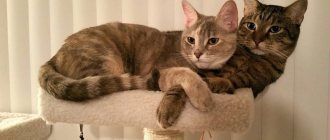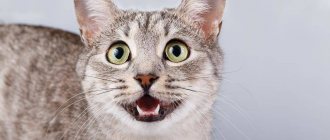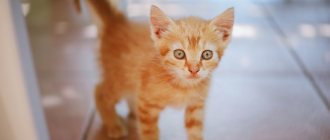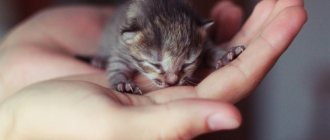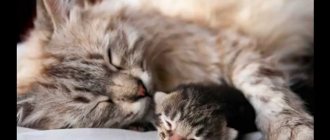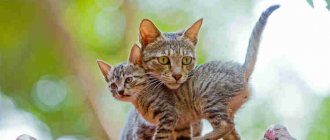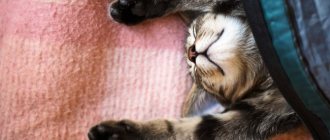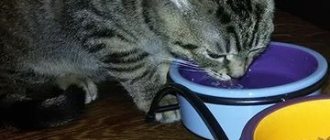(Be the first to vote!)
5589564
05/19/2021 owner reviews
“What to expect? What is this? Why do kittens die? Yes. The search is not wrong. Kittens do die suddenly and yes, it is very sad.
It's just the circle of life. It's not easy for cats to survive in this world. From searching for food, water and shelter... staying alive was challenging to say the least. Harsh winters don't help either...you'll find that many unprepared cats won't be able to handle the cold.
However, not all of this is depressing! Life is meant to be a gift, and for those who can hunker down and survive, they can do what all other animals do in the springtime: gain experience!
The kittens you find at your local shelter or pet store tend to be lively and a little mischievous. However, before kittens can be accepted into these shelters and adoption centers, they must first be nursed to a certain age of maturity. Many foster parents who have struggled to raise these little kittens may be faced with a tragic problem. Unfortunately, many kittens under nine weeks of age eventually die due to fading kitten syndrome.
- So... What is Fading Kitten Syndrome?
- What Causes Fading Kitten Syndrome?
- Symptoms of Fading Kitten Syndrome
- What to do
Causes and timing of death of kittens
From seven to nine percent of purebred cats are born dead, or do not live longer than a week (they die). Another critical moment in development occurs at one month of age, when weaning from mother's milk, which gives immunity to infections. Non-viable cubs that die during breastfeeding are called “fading”.
What can kill a kitten - hypoglycemia, hypothermia, dehydration.
Sometimes the death of a newborn cat occurs unexpectedly. But most weakened babies develop symptoms of decline a few days before death: refusal of milk, restless behavior. At this stage, the baby can be helped by providing the necessary care and nutrition. The owner may not notice the dangerous signs in time, and then the process will become irreversible. The blood sugar level will decrease catastrophically, the frozen kitten will have a drop in body temperature (<34⁰C), pulse and breathing intensity will decrease until the heart rate completely stops and death.
Newborn kittens have eaten and sleep
Preventing dehydration
It is easier and simpler to prevent any pathology with preventive measures than to treat and eliminate its consequences. This also applies to dehydration in cats. To prevent your beloved pet from suffering from water deficiency:
- She should be fed only food that her body can best digest. Ideally, this is ready-made food from the store;
- you cannot offer the animal food from your table, as well as foods that can cause allergies;
- the owner must ensure that the cat has free access to a bowl with plenty of cool and fresh water;
- the animal must be vaccinated in accordance with its age and habitat, and also undergo periodic examinations by a veterinarian;
- Pathologies identified in a cat should be treated, strictly following all the doctor’s instructions.
How and what to feed kittens and cats correctly (industrial food)
Attention! The owner must monitor how much the cat drinks per day, as well as control the amount of urine in the tray and the frequency of bowel movements. If the animal does not defecate daily, and the feces are hard and dense, there may be a water deficiency. It is important to monitor the cat’s behavior, as well as its appetite. All deviations, if they are not caused, for example, by weather and character, may indicate disorders in the body. To dispel or confirm doubts, you should show your pet to a veterinarian.
Hypoglycemia
Until the age of four weeks, the glycogen content in the kitten’s body is low. At this stage of life, muscle contractions, rather than the breakdown of glucose and brown fat, are responsible for heat production. Lack of glucose leads to hypoglycemia. A common cause is a large number of babies or insufficient milk from a nursing mother.
Glucose deficiency manifests itself:
- lethargy;
- passive behavior;
- convulsions;
- drop in body temperature.
At the initial stage, the baby can be saved by introducing additional complementary foods (natural milk substitute) and vitamins. If the disease is complicated, the veterinarian may prescribe an oral glucose solution. Injections under the skin at an early age are not recommended.
Hypothermia
The first weeks after birth, maternal warmth is vital for kittens, since the cubs’ own thermoregulation is far from perfect. Instinct dictates that mothers should not leave their furry babies alone for long periods of time. If the nest with babies is located in a cold place in the home, the cat can, on its own initiative, drag the offspring. The temperature in the room where babies grow should be maintained above 22 °C.
A kitten that finds itself far from the nest will have a gradual decrease in body temperature. The limit of 34 °C is a critical value at which the sucking reflex ceases to appear in a frostbitten kitten and digestive processes freeze. The mother will not care for such a child; without human help, the kitten will die. You can warm up your kitten using a heating pad and a warm blanket. Only after the animal’s temperature rises to 36 °C can you feed the baby formula using a pipette or bottle.
Attention! Giving food to a kitten (who is shivering) with a low temperature is dangerous. The milk will either enter the respiratory system or remain undigested inside the stomach. Both options will lead to immediate death.
Dehydration
Newborn animals must consume much more fluid than adults, as they rapidly lose moisture from the surface of the body. The average water consumption rate for a baby is 150 ml per kg of body weight, which is approximately twice as much as for an adult cat. Lack of milk or diarrhea leads to rapid development of dehydration. For these symptoms, your veterinarian will usually prescribe saline injections.
The air humidity in the room where the cubs grow must be at least 60%.
Tips from pet owners
I understand you very much and sincerely sympathize with you! My 8-year-old cat also died a week ago... And for me it turned out to be not so easy to bear the loss of an animal and forget it. But life goes on. God bless! And we must take care of those who live and need us. You need to immediately get another animal, and you will love it too. It’s just not known what problem your kitten had and so that it (if it’s infectious) is not passed on to new ones. Therefore, I advise you to find a good (I understand that this is very difficult here) veterinarian. He will advise, and will come in handy more than once.
Nikolai
https://forum.webmvc.com/index.php?/topic/540-%D0%BA%D0%B0%D0%BA-%D0%BF%D0%B5%D1%80%D0%B5%D0 %B6%D0%B8%D1%82%D1%8C-%D1%81%D0%BC%D0%B5%D1%80%D1%82%D1%8C-%D0%BD%D0%B0%D1 %88%D0%B8%D1%85-%D0%BB%D1%8E%D0%B1%D0%B8%D0%BC%D1%86%D0%B5%D0%B2/&do=findComment&comment=1360
She suffered the death of her 9-year-old cat very hard. He was a house cat, but one day, when there were many guests in the house, he ran out into the street. While they were looking for him, some freak set a dog on him... I found what was left of him in a very terrible state. I don’t remember how I lived for a month. Tears. She blamed herself for not saving her. A month later I was able to find consolation in the fact that now he is not in pain, he must be fine THERE... And after some time, I took a small kitten and convinced myself that the soul of my cat had moved into it. Believe it or not, he is very similar in character to that one. True, 10 years later, for some reason, in severe frosts, I still remember my Dima and cry. It seems to me that he is cold there... And you can still reassure yourself that your cat, presumably, lived his life, and quite a long one, in good conditions, in love... Tell yourself - if he were older, he could have suffered from some senile diseases. Maybe the way it happened was for the better, he didn’t experience much pain in his life...
Carrie
https:///board/pets/flat/1908348597/?fpart=1&per-page=50#Post1908355097
Things to Remember You are a unique individual and your grief journey will be different from other people's. Your personal grieving period will also vary in intensity and duration depending on your past life experiences. Below are a few of the many ways you can use to express your pain and speed up the “healing” process:
* open expression of emotions such as crying, talking about loss, etc.
* drawing, writing poetry or other artistic expression
* internal experiences, thinking about the loss, trying to understand it, often occurring during activities such as meditation, exercise, cycling
* devoting time to animal protection organizations, shelters, etc.
* making positive changes in your personal life
* compiling an album with photographs of your pet, memories of him, etc.
* keeping a diary or journal describing and documenting your experiences
Friends or family members may try to convince you to adopt a new pet before you feel ready. You are the only person who knows exactly when and if the time comes for such a commitment.
[Based on materials from the AKC Canine Health Foundation, Translation from English by Isaeva I.V., 2009]
AWL, administrator
https:///viewtopic.php?id=1963
It is impossible to prepare for the death of a loved one. Accepting and coming to terms with it is very difficult. But we have the power to preserve good memories of a departed pet, whose existence made our life funnier and more hectic, calmer and more comfortable. The task is not to forget, but to come to terms with it. And the pain of loss should not poison life, which continues no matter what.
Birth trauma and birth defects
Early mortality is often associated with oxygen starvation of the body due to delay in the birth canal or late opening of the fetal membrane. A female giving birth for the first time may need human assistance. This is especially important if labor is prolonged.
Experience shows that resuscitation of a newborn kitten without signs of life does not give positive results. Lack of oxygen immediately after birth has fatal consequences: serious damage to the nervous system and brain of the baby. It is also very difficult to resuscitate premature kittens.
Anomalies that cause death:
- cleft palate;
- absence of anus;
- navel hernia;
- cleft lip;
- skeletal deformity;
- disorders of blood supply and cardiovascular activity;
- respiratory system defects;
- absence of organs.
If the birth of children with serious pathologies recurs, the female should be sterilized.
You can bring a baby back to life in the following cases:
- the baby was born with low body weight;
- the baby’s cranial bones or ribs are deformed;
- one or more limbs are missing.
Making a decision about the need for resuscitation measures falls entirely on the shoulders of the animal owner. It should be taken into account that a cat with congenital defects will have reduced immunity.
In addition to these reasons, the death of a newborn may be a consequence of an infection transmitted in the womb of the mother.
Photo - British kittens after eating
Diagnosis at home
In addition to those listed above, signs of dehydration include:
- coldness of the cat’s heels and toes;
- dull and dry coat;
- the animal’s reluctance to groom itself;
- difficulties with bowel movements.
Unfortunately, all this can indicate a number of other health problems, and to make sure that the problem is a lack of water, a caring owner should do the following:
- Examine your pet's oral cavity, paying special attention to the gums. If you press lightly with your finger, they will normally turn pale, but after 3-5 seconds they will restore their color. When dehydrated, this happens longer, and when the time drags on to 10 seconds, we can talk about an extreme degree of dehydration.
- Check skin elasticity. Pulled at the withers of a healthy animal, it instantly returns to its original state. Weak turgor, when the skin straightens for more than 2 seconds, may indicate a lack of water in the body. If it takes more than 6 seconds, the pet's condition is serious.
The pulled skin on the withers of a healthy animal instantly returns to its original state
When checking turgor, you should keep in mind that:
- The skin of kittens under 8 months is rougher than that of adults, so it takes longer to regain its shape;
- In animals with signs of obesity, the dermis is more elastic than in relatives with normal weight.
If home diagnostic methods reveal a serious lack of water in your pet’s body, you should rush to the veterinary clinic.
Maternal factor
One of the causes of mortality is maternal misbehavior. It happens that a mother eats the weakest child in order to feed the rest of the offspring. This instinct was a feline inheritance from wild relatives. If a domestic cat has eaten the entire litter, the female must be spayed, otherwise this will happen again in the future.
An inexperienced mother can leave her children alone for a long time, in which case the pets develop hypothermia.
Insufficient quantity or low fat content of milk can also disrupt the normal development of children. The reason is too young age, exhaustion or obesity of the woman in labor.
Photo of a warm playpen with newborn kittens
Tags
life of a cat If a cat is a motherfeeding a cat specialchildren by a cat bringsIf a cat does not give birth to a cat.Why do cats loveWhich cat do you like cats if the cat wantsEarly mortality observedearly death of babiesapproaching death of early death of babiesEarly death of kittenstotal mortality premature pets diestomach pet non-domestic pets.pets help pet furry pet.pets nao in pets direct pets in some cases it is unnecessary in this case to help in extreme cases it will do in my case this is an unpleasant case ..
deadbreedsanswerdead ashessomeburyburials
Causes of mortality in growing kittens
After leaving the breastfeeding period, the animal's immune system is subjected to serious tests. Until this moment, the baby is protected by mother's milk, and inside the womb - the fetal membrane.
A sick cat can cause infection in babies when it bites the umbilical cord. If the female has mastitis, staphylococci and streptococci will pass to the cubs through the milk. Chlamydia causes pneumonia and purulent conjunctivitis. If examination of the female shows the presence of infectious diseases, the children must be transferred to artificial nutrition.
Viral infections
Intrauterine pathogens include herpes viruses, calcivirosis and panleukopenia. These diseases and illnesses cause death on the second or third day after birth.
The next dangerous period begins after the eighth week of life, so cats must be vaccinated against viruses at the age of two months.
Parasites
Can you die from worms, depriving? Round nematodes can enter a cat's intestines both before and after birth. A large number of worms leads to a reduction in nutrients entering the body, as well as poisoning by parasite waste. The worst case of injury is intestinal rupture.
Fleas themselves are not fatal. However, these insects are carriers of many infectious diseases and cause allergies. Flea bites cause itching and inflammation on the skin. Pathogenic bacteria multiply in scratches left after scratching. The presence of fleas in a pet reduces the body's resistance to dangerous diseases.
Foreign objects
Growing pets tend to try everything interesting. Often this interest causes objects to enter the digestive or respiratory system. Cats with long hair, when licking themselves, swallow a large number of individual hairs. Hair that gets into the stomach forms hard clumps that can block the intestines and cause peritonitis. In such a situation, an emergency call to the doctor is necessary.
How to understand that a cat is dying
In this article I will talk about how to cope with grief when a cat dies, how to bury it correctly and where. I’ll speculate on the topic of whether these mysterious animals have a soul and whether there is a cat paradise. I’ll look at the signs that help you understand that your pet is dying.
Cats can live more than eighteen years and leave fond memories of themselves. During this period, the furry purr becomes a full-fledged member of the family, so the death of a pet can turn into a serious tragedy for the owners, which is experienced for years.
What to do if a kitten is dying
Death within the first three days after birth affects terminally ill animals. Babies who fall ill after this period can be saved with timely medical care.
Indications that indicate that you urgently need to see a veterinarian:
- lack of appetite (poor eating);
- diarrhea and vomiting;
- body temperature is higher or lower than normal;
- lack of coordination of movements;
- underweight (not gaining);
- convulsions;
- bleeding;
- traumatic injury;
- purulent discharge from the nose, ears or eyes.
Before the doctor arrives, you need to warm and calm the kitten. The best way is to hold the baby close to you.
Umbilical inflammation
This problem occurs when the umbilical cord is not processed correctly:
- Its remainder is too short or, on the contrary, long.
- The kitten is in unsanitary conditions.
- The cat has problems with her teeth and oral cavity.
A sick kitten's navel is swollen, inflamed and red. Purulent discharge oozes from it. To prevent the development of this situation, you need to properly cut and treat the umbilical cord at birth with antiseptics.
Complications leading to the death of a kitten
Kittens that have suffered birth trauma or intrauterine infection are at risk. Low weight and a weakened body will not allow such a baby to withstand competition with its brothers in the fight for mother's milk.
The respiratory processes of a sick cat are inhibited, the sucking reflex is weak, the body temperature drops below normal, the functioning of the circulatory system slows down, and then motor activity is lost. These processes irreversibly lead to convulsions, coma and death.
Dehydration
A kitten's kidneys are underdeveloped (compared to an adult animal) and excrete a large amount of fluid. Therefore, the body of a cat baby needs a constant supply of moisture. If the baby eats sluggishly or shows symptoms of diarrhea, this is a harbinger of impending dehydration. Weight loss is caused by fluid loss. Other signs of dehydration:
- dry mouth;
- bright pink color of the tongue and mucous membrane;
- flabby body muscles;
- drop in physical activity.
Symptoms of dehydration indicate the need to provide additional nutrition for the baby. Your veterinarian may recommend saline injections.
Hemolysis
Hemolysis is a disease caused by an unfortunate combination of the blood types of the father and mother of the cub. From the moment of birth, the kitten’s body begins to destroy foreign red blood cells. Antibodies that enter the bloodstream with mother's milk are responsible for this protective process.
Each blood group (A, B or AB) has its own type of antibodies. At the same time, antibodies of group B are hostile (bind) to red blood cells of group A. If the baby has inherited the paternal blood group A or AB, then the antibodies obtained with mother's milk (type B blood) will lead to the destruction of red blood cells, the development of anemia and complete metabolic disorders in the body.
The process of breakdown of red blood cells is especially active in the first days after birth. As a measure to protect babies at risk, they are bottle-fed formula for the first 16 hours. After this time, the walls of the baby’s intestines become stronger and stop allowing antibodies into the blood. The negative consequences of such precautions are due to the fact that in the first hours the baby’s body receives globulins, which are responsible for the state of the body’s immune system.
If it is not possible to determine the baby’s blood type, you can look at the color of the baby’s urine after the first reduced intake of mother’s milk. A brown tint will indicate problems with antibodies. To minimize the risk of hemolysis, breeders adhere to the following rules: cats with blood type B can be crossed with any partners, cats with blood type A can be bred with any cats. Cats with type A are only allowed to mate with animals of the same blood group.
Conjunctivitis
Kittens' eyelids remain closed until ten days after birth. If there are minor injuries, pathogenic bacteria and viruses can enter the sinus between the eyelid and the eye. If the eyelids are swollen and red, and purulent discharge flows from the eye, there is a reason to consult a veterinarian. Among the causes of such symptoms may be intrauterine infection with viral herpes.
Usually the disease affects several babies at once. To treat the eyelids, you need to peel them apart, wash your eyes with a two percent solution of boric acid and take a course of antibiotic treatment (in drops).
Brits crawl into a ball to stay warm
Dehydration
In other words, dehydration. It occurs not only against the background of any disease, but also as an independent phenomenon when a small pet is not able to reach breast milk.
Signs of manifestation:
- Dryness of the oral mucous membranes.
- Weak muscle tone.
- Bright red color of the baby's mouth and tongue.
Dehydration can only be treated with veterinary prescriptions. Artificial complementary feeding is used as a preventive measure.
Causes of cat death
There are times when an apparently healthy animal dies instantly for no apparent reason. The most common causes of acute sudden death include:
- Intoxication with household poisons, lilies or antifreeze. Cat owners should be aware that lilies contain a substance that is fatal to cats.
- Disease of the cardiovascular system. British, Scottish Fold, and Sphynx breeds are predisposed to heart disease (hypertrophic cardiomyopathy). The disease can occur with the formation of blood clots or pulmonary edema.
- Pneumothorax is a breakthrough of air into the pleural cavity from outside or outside. May be the result of injury or physical overload. For prevention, a respiratory examination should be performed.
- Perforated stomach ulcer. A proper diet will help you avoid the disease.
- A ruptured tumor of the spleen. An ultrasound can help diagnose a tumor inside a cat's abdominal cavity.
- Foreign object in the throat. If the cat is inclined to chew anything, the animal should not be left unattended for a long time. When leaving home, the owner can limit the animal's movement area to a separate room or corridor.
- Intestinal blockage. Symptoms: vomiting, decreased appetite, lethargy, dehydration. Often a cat tries to hide from people.
- Heat shock. A person does not realize how quickly a small animal can overheat. As a result of heat exposure, the cat's pulse and breathing rates increase, the temperature rises, and the animal quickly falls into a coma. In hot weather, your pet should always have plenty of water to drink.
- Electric shock. With active tooth growth, a young cat can chew the wires of live household appliances. Electric shock causes cardiac arrest and death.
Signs associated with the death of a cat in the house
There are many signs associated with the death of these animals in the house:
- a cat that dies naturally takes with it troubles, envy, slander and the evil eye;
- a pet dying due to the fault of family members means theft;
- an animal killed due to household appliances means trouble in business;
- a cat accidentally falling to its death from a window is a sign warning of the imminent dissolution of a marriage;
- a pet who has died as a result of poisoning warns the owner that new acquaintances can bring him a lot of problems;
- An animal that died due to a fight with relatives means disagreements with friends.
To believe or not in the listed signs is a personal matter for everyone. It’s better to try to prevent such a sad event, and if this is impossible, treat it wisely.
Unfortunately, neither people nor cats last forever on this earth. In any case, the owner has to see the death of the latter, because purrs live for about 15 years. But you still need to know when this moment will come.
New friend, new life
You shouldn’t “knock things out” and immediately get a new pet after the death of a cat. Before you get a new animal, think about whether you can love it or whether it will be a painful reminder of an old friend?
Don’t try to immediately replace your old attachment with a new one, sort out your feelings
How can we help?
How to help a dying cat? Just like a person. Make her last days and hours calm and happy. There is no need to cry or otherwise irritate the dying woman. Let these hours, the last ones next to your beloved, be filled with light sadness, like a calm autumn day, and not a storm.
In addition to warmth and being surrounded by love, you need to provide your pet with everyday comfort. If the cat no longer walks, absorbent diapers are required. A dry shampoo that does not require rinsing will come in handy to keep your animal's fur clean. You also need to take care of the absence of drafts. Of course, they will no longer affect the health, but will cause significant discomfort to the pet.
You should not assume that a cat cannot be picked up or otherwise disturbed. This moment depends on her state and on her internal intuitive feeling. If you want to take your pet home and watch a movie with her, that’s what you need to do.
Are cat bites dangerous for humans?
Cat bites and scratches should not be ignored. They can lead to serious infections such as Pasteurella multocida, which occur when bacterial organisms of the Pasteurella species enter the body through punctures in the skin. This can lead to inflammation and suppuration of the subcutaneous tissue. Cats also often harbor the potentially dangerous organisms fusobacterium and streptococcus species, which can cause a wide range of infections such as tonsillitis and scarlet fever, as well as the bacteria bartonella henselae, which can cause a condition called cat scratch fever.


